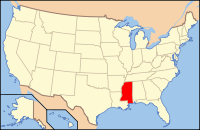Quitman County, Mississippi
| Quitman County, Mississippi | |
|---|---|

Quitman County Courthouse
|
|
 Location in the U.S. state of Mississippi |
|
 Mississippi's location in the U.S. |
|
| Founded | 1877 |
| Named for | John A. Quitman |
| Seat | Marks |
| Largest town | Lambert |
| Area | |
| • Total | 406 sq mi (1,052 km2) |
| • Land | 405 sq mi (1,049 km2) |
| • Water | 1.4 sq mi (4 km2), 0.3% |
| Population | |
| • (2010) | 8,223 |
| • Density | 20/sq mi (8/km²) |
| Congressional district | 2nd |
| Time zone | Central: UTC-6/-5 |
Quitman County is a county located in the U.S. state of Mississippi. As of the 2010 census, the population was 8,223, making it the fifth-least populous county in Mississippi. Its county seat is Marks. The county is named after John A. Quitman, Governor of Mississippi from 1835 to 1836 and from 1850 to 1851.
Quitman County is located in the Mississippi Delta region of Mississippi.
The county was developed for cotton cultivation. Much of the bottomlands behind the riverfront were not developed until the late 19th century, and population continued to increase as the frontier was cleared and cultivated. The county reached its peak population in 1940. Agricultural mechanization reduced the need for farm labor, and workers were recruited to northern and midwestern industrial cities. Thousands of African Americans left in the Great Migration, many going upriver to St. Louis and Chicago.
Martin Luther King originally wanted the Poor People's Campaign to start in Quitman County because of the intense and visible economic disparity there. On March 18, 1968, King visited the town of Marks, Mississippi. He watched a teacher feeding black schoolchildren their lunch, consisting only of a slice of apple and some crackers, and was moved to tears.
After King's death, the Southern part of the Campaign began in Quitman County. Participants rode a train of mules to Washington, D.C. to protest about economic conditions. According to wagonmaster Willie Bolden, white citizens of Marks harassed the mule train on its way out of town. Bolden stated that they "would drive by blowing their horns, purposely trying to spook the mules and us." More recently, Quitman County residents have made an effort to promote tourism based on the county's role in the Poor People's Campaign.
...
Wikipedia
